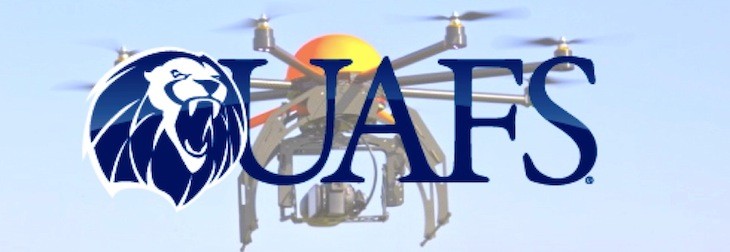UAFS offering pilot licensing course for unmanned aircraft
by February 22, 2017 3:40 pm 638 views

The University of Arkansas at Fort Smith is offering a non-credit course for those interested in being a licensed commercial pilot of unmanned aircraft – aka, drones. It’s the first of what UAFS officials say could be “many” programs related to unmanned aircraft.
The class will be offered through the Center for Business and Professional Development, and will be held 8 a.m. to 5 p.m. March 13-17 at the UAFS campus. The registration fee is $1,995 per person. Industry partners collaborating with UAFS on unmanned aircraft offerings include the 188th Wing of the Arkansas Air National Guard; enrGies, a company based in Huntsville, Ala.; and Mag Aerospace, a company based in Woodbridge, Va.
In the 40-hour course, students will acquire the basic aviation knowledge to pass the initial Federal Aviation Administration (FAA) Part 107 knowledge exam and obtain a remote Pilot in Command certificate, which is required to conduct small unmanned aircraft system commercial operations.
Course students will take the Part 107 exam at the official FAA testing site at Drake Field in Fayetteville. The registration fee does not cover the fee for the knowledge exam.
The class is also the beginning of what the university plans to be a series of coursework surrounding unmanned aircraft, a rapidly growing field that has application in a number of industries in Fort Smith, Arkansas and beyond.
In a study by the Association for Unmanned Vehicles Systems International, the unmanned aircrafts systems industry is forecast to create more than 600 jobs and nearly $500 million in economic impact in Arkansas in the next 10 years. The consulting firm PricewaterhouseCoopers has predicted the world drone market could be valued at $127 billion by 2020.
“Unmanned Aircraft Systems is a growing industry in Arkansas, and the coursework at UAFS will help train remote pilots that are needed to meet the many anticipated opportunities in this field,” said Brian Wynne, president and chief operating officer of the Association for Unmanned Vehicles Systems International. “Already, commercial operators in the state are using UAS technology for precision agriculture and oil and gas exploration. With more pilots such as those trained at UAFS entering the workforce, a burgeoning UAS market is about to be unleashed in Arkansas.”
Drone Industry Insights has predicted that 2017 will be the year a transition begins from exploring drone use to broader use of drones in real world applications.
“Professionals in oil & gas, construction, precision agriculture, process & utilities, mining & aggregates, law enforcement/emergency response/search & rescue as well as civil infrastructure are all looking at drone technology in a completely different light, but that doesn’t mean adoption is going to be a simple or easy task,” the report noted. “There will also be challenges associated with sorting out what it means to secure proper insurance, changing public perception around commercial drone operations and what it means to scale a drone program.”
Dr. Ken Warden, dean of the College of Applied Science and Technology, said the university will address that growth through a comprehensive approach to unmanned aircraft education.
“We’re developing more coursework to implement a full non-credit program of study that incorporates operations, maintenance, regulations, data collection, data analytics, and other areas of study that go along with the uses of unmanned vehicles,” Warden said. “Our approach is not to address one industry, but to address how this technology can be utilized across many industries and offer coursework that is transferable and has multiple industry applications.”
Warden said the university is exploring the option of extending coursework into academic courses if a need is demonstrated through the CBPD’s non-credit classes.
“If we see the need is there, the plan is to embed this into an academic program of study fairly quickly,” Warden said. “We plan to scale this and build a career pathway so someone has the option of getting a short-term certificate up to an associate degree.”
“There’s not a widely accepted credential for maintenance, operation and usage of unmanned aerial vehicles,” Warden continued. “We want to become a seal of approval that’s recognized around the region and nation. We want people to be able to come here, go through the coursework validated by our industry partners, and find employment with skills that are industry relevant.”
